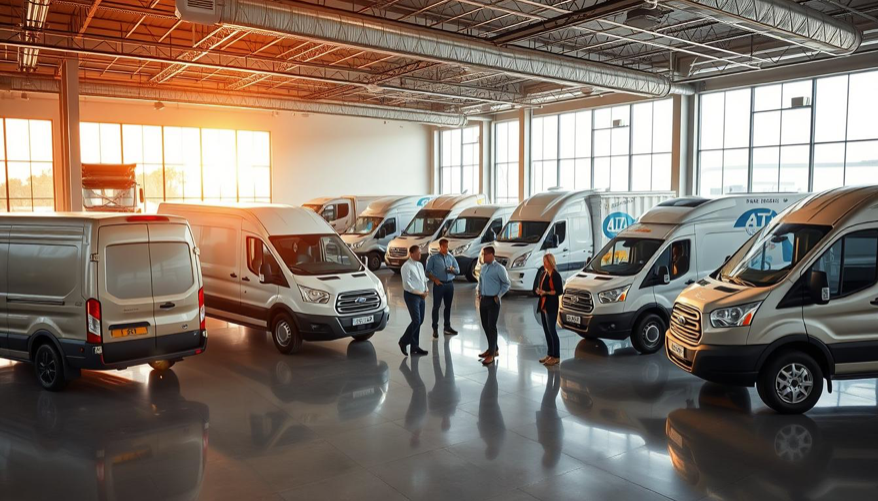Running a business involves countless risks—from property damage and customer injuries to employee-related issues and cyber threats. Without proper protection, a single incident could potentially devastate your company financially. Commercial insurance serves as your business's safety net, providing crucial coverage against these risks and giving you peace of mind to focus on growth rather than worry about what might go wrong.
Understanding the various types of commercial insurance available is vital for ensuring your business has comprehensive protection tailored to your specific needs. In this guide, we'll explore the essential types of commercial insurance every business should consider, what each covers, and how they work together to safeguard your company's future.
Why Your Business Needs Commercial Insurance

Commercial insurance isn't just a regulatory requirement—it's a fundamental aspect of sound business management. Even the most carefully run businesses face unexpected events that can lead to significant financial losses. Here's why having adequate commercial insurance coverage is essential:
Protection Against Lawsuits
In today's litigious business environment, lawsuits can arise from customers, employees, vendors, or even passersby. Legal defense costs alone can run into tens of thousands of dollars—even if you've done nothing wrong. The right liability insurance coverage helps cover these expenses and potential settlements.
Safeguarding Business Assets
Your business has invested significantly in property, equipment, inventory, and other physical assets. Commercial property insurance helps protect these investments from damage due to fire, theft, vandalism, and certain natural disasters, ensuring you can recover and resume operations quickly.
When disaster strikes, business interruption insurance helps replace lost income and covers operating expenses while your business recovers, potentially preventing permanent closure due to temporary setbacks.
Workers' compensation insurance not only protects your employees if they're injured on the job but also shields your business from related lawsuits and helps you comply with state regulations.
General Liability Insurance
General liability insurance is the foundation of most business insurance programs. It protects your business from financial losses resulting from bodily injury, property damage, and advertising injury claims.
What General Liability Insurance Covers
Bodily Injury: If a customer slips and falls on your premises, general liability helps cover their medical expenses and your legal defense if they sue.
Property Damage: If your employee accidentally damages a client's property while performing services, this coverage helps pay for repairs or replacement.
Advertising Injury: Protection against claims of libel, slander, copyright infringement, and other advertising-related issues.
Legal Defense Costs: Covers attorney fees, court costs, and settlements or judgments if your business is sued for covered claims.
Who Needs General Liability Insurance?
Virtually every business should have general liability insurance. It's particularly crucial for:
- Retail businesses
- Restaurants
- Service providers
- Contractors
- Consultants
- Property managers
- Manufacturing companies
- Wholesalers
- Event planners
Real-World Scenario: A plumbing contractor is working in a client's home when they accidentally damage an expensive water pipe, causing flooding that ruins the client's hardwood floors. General liability insurance would help cover the cost to repair the floors and any legal expenses if the client sues.
Protect Your Business from Liability Claims
Don't let an unexpected accident put your business at risk. Our general liability insurance provides comprehensive protection tailored to your specific industry needs.
Commercial property insurance protects your business's physical assets from damage or destruction. Whether you own or lease your business space, this coverage is essential for protecting buildings, equipment, inventory, furniture, and other property vital to your operations.
What Commercial Property Insurance Covers
Buildings: Coverage for structures you own or are responsible for under a lease agreement.
Business Personal Property: Protection for equipment, furniture, inventory, and supplies.
Business Income: Some policies include coverage for lost income if property damage forces you to suspend operations.
Electronic Data: Coverage for data loss due to covered perils like fire or water damage.
Common Covered Perils
- Fire and smoke damage
- Lightning strikes
- Windstorms and hail
- Explosion
- Vandalism and theft
- Water damage from plumbing issues
- Damage from vehicles or aircraft
- Riot or civil commotion
- Falling objects
- Weight of ice, snow, or sleet
Important Note: Standard commercial property insurance typically does not cover damage from floods or earthquakes. Separate policies or endorsements are usually needed for these perils.
Real-World Scenario: A severe storm damages the roof of a retail store, allowing water to enter and destroy inventory and fixtures. Commercial property insurance would help pay for roof repairs and replace the damaged inventory, enabling the business to reopen quickly.
Business Interruption Insurance
When disaster strikes and forces your business to temporarily close, the loss of income can be devastating. Business interruption insurance (also called business income coverage) helps replace lost revenue and covers ongoing expenses during the recovery period.
What Business Interruption Insurance Covers
Lost Net Profit: Replaces income you would have earned if your business had remained operational.
Fixed Costs: Covers ongoing expenses like rent, loan payments, and utility bills.
Temporary Relocation: Helps pay for moving to and operating from a temporary location.
Employee Wages: Ensures you can continue paying employees during the closure.
Taxes: Covers tax obligations that continue regardless of whether you're operating.
"Business interruption insurance was a lifesaver when we had to close for three months after a fire. Without it, we might have had to close permanently."
— Small Business Owner
Real-World Scenario: A restaurant suffers extensive fire damage and must close for four months for repairs. Business interruption insurance helps cover rent, loan payments, employee salaries, and lost profits during the closure, allowing the restaurant to reopen without crippling financial losses.
Don't Let Disaster Close Your Business Permanently
Business interruption insurance provides the financial support you need to weather temporary closures and get back to business faster.
Workers' Compensation Insurance
Workers' compensation insurance provides benefits to employees who suffer work-related injuries or illnesses. This coverage is mandatory in most states for businesses with employees, though requirements vary by location and industry.
What Workers' Compensation Insurance Covers
Medical Expenses: Covers treatment costs for work-related injuries or illnesses, including hospital stays, doctor visits, medications, and rehabilitation.
Lost Wages: Provides partial replacement of wages while an employee is unable to work.
Disability Benefits: Offers compensation for temporary or permanent disabilities resulting from workplace injuries.
Vocational Rehabilitation: Helps injured workers return to the workforce through training or education if they cannot return to their previous position.
Death Benefits: Provides financial support to dependents of employees who die from work-related causes.
Did You Know? According to the National Safety Council, the average workers' compensation claim for a slip and fall injury costs over $47,000, while motor vehicle accidents in the workplace average more than $81,000 per claim.
Real-World Scenario: A warehouse employee strains their back while lifting heavy inventory. Workers' compensation insurance covers their medical treatment, physical therapy, and partial wage replacement during recovery, protecting both the employee and the business from financial hardship.
Workers' compensation insurance also protects employers by limiting their liability for work-related injuries and illnesses. In most cases, employees who accept workers' compensation benefits cannot sue their employer for additional damages related to the injury.
Commercial Auto Insurance

If your business owns, leases, or uses vehicles for business purposes, commercial auto insurance is essential. Personal auto policies typically exclude business use, leaving your company exposed to significant financial risk without proper commercial coverage.
What Commercial Auto Insurance Covers
Liability Coverage: Pays for bodily injury or property damage your business vehicles cause to others.
Collision Coverage: Covers damage to your business vehicles from accidents, regardless of fault.
Comprehensive Coverage: Protects against non-collision incidents like theft, vandalism, fire, or natural disasters.
Medical Payments: Covers medical expenses for you and your passengers after an accident.
Uninsured/Underinsured Motorist Coverage: Protects you when an accident is caused by a driver with insufficient or no insurance.
Who Needs Commercial Auto Insurance?
You likely need commercial auto insurance if your business:
- Owns or leases vehicles
- Uses vehicles to transport goods
- Delivers products or services
- Has employees who drive for work
- Transports tools or equipment
- Hauls materials or products
- Provides client transportation
- Uses vehicles for sales calls
- Has a fleet of any size
Real-World Scenario: An employee driving a company van to a job site runs a red light and collides with another vehicle, injuring the other driver. Commercial auto insurance would cover the other driver's medical expenses, vehicle repairs, and legal costs if they sue, potentially saving the business hundreds of thousands of dollars.
Protect Your Business Vehicles and Drivers
Our commercial auto insurance provides comprehensive coverage tailored to your business's specific vehicle usage and risk profile.
Professional Liability Insurance

Professional liability insurance, also known as errors and omissions (E&O) insurance, protects businesses that provide professional services or advice. It covers claims of negligence, mistakes, or failure to deliver promised services that result in financial harm to clients.
What Professional Liability Insurance Covers
Professional Negligence: Claims that your professional services failed to meet expected standards.
Misrepresentation: Allegations that you misrepresented your services or made misleading statements.
Breach of Contract: Claims that you failed to deliver services as promised in a contract.
Incomplete or Late Work: Financial losses clients suffer due to work that was delivered late or left incomplete.
Legal Defense Costs: Attorney fees, court costs, and settlements or judgments for covered claims.
Who Needs Professional Liability Insurance?
Professional liability insurance is crucial for businesses that:
- Provide professional advice
- Offer consulting services
- Design or engineer products
- Provide medical or legal services
- Manage finances or investments
- Develop software or technology
- Offer marketing or advertising
- Provide architectural services
- Work as contractors or subcontractors
Real-World Scenario: A financial advisor recommends an investment strategy that performs poorly, causing significant losses for a client. The client sues, claiming negligent advice. Professional liability insurance would cover the advisor's legal defense costs and any settlement or judgment, potentially saving their business.
Product Liability Insurance
If your business manufactures, distributes, or sells products, product liability insurance is essential protection against claims that your products caused injury or property damage. Even with rigorous quality control, unforeseen issues can arise, making this coverage vital for product-based businesses.
What Product Liability Insurance Covers
Design Defects: Claims that a product's design is inherently dangerous or defective.
Manufacturing Defects: Issues that occur during production that make products dangerous.
Marketing Defects: Inadequate instructions, improper labeling, or insufficient safety warnings.
Legal Defense: Attorney fees, court costs, and settlements or judgments for covered claims.
Medical Costs: Expenses for treating injuries caused by your products.
Important: Product liability claims can arise years after a product is sold, and costs can be substantial. The average product liability claim exceeds $300,000, with some reaching millions of dollars.
Real-World Scenario: A furniture manufacturer sells a chair that collapses due to a hidden defect in the leg assembly, causing injury to the customer. Product liability insurance would cover medical expenses, legal defense costs, and any settlement or judgment, protecting the manufacturer from potentially devastating financial losses.
Cyber Liability Insurance

In today's digital business environment, cyber threats pose significant risks to companies of all sizes. Cyber liability insurance helps protect your business from the financial fallout of data breaches, ransomware attacks, and other cyber incidents.
What Cyber Liability Insurance Covers
Data Breach Response: Costs for notifying affected individuals, providing credit monitoring, and public relations efforts.
Cyber Extortion: Ransom payments and related expenses if your data is held hostage.
Business Interruption: Lost income and extra expenses if a cyber attack disrupts operations.
Data Recovery: Costs to restore or recreate data lost in a breach.
Liability Claims: Legal expenses and damages if customers or partners sue after a breach.
Regulatory Fines: Penalties imposed by government agencies for data protection violations.
"The average cost of a data breach in the United States is $9.44 million, making cyber liability insurance an essential protection for businesses that handle sensitive data."
— IBM Cost of a Data Breach Report
Real-World Scenario: A small accounting firm suffers a ransomware attack that encrypts client tax records and financial data. Cyber liability insurance would help cover the ransom payment (if necessary), data recovery costs, notification to affected clients, credit monitoring services, and potential legal claims from clients whose data was compromised.
With the increasing frequency and sophistication of cyber attacks, cyber liability insurance has become essential for businesses of all sizes, particularly those that:
- Store customer data
- Process credit card payments
- Maintain confidential information
- Rely on computer systems
- Use cloud services
- Have a website or online presence
- Allow remote work
- Use email communication
- Store proprietary information
Additional Types of Commercial Insurance
Beyond the core commercial insurance types, several specialized coverages can provide additional protection for specific business needs and risks:
Employment Practices Liability Insurance (EPLI)
Protects against claims by employees alleging discrimination, wrongful termination, harassment, or other employment-related issues. EPLI covers legal defense costs and settlements or judgments for covered claims.
Directors and Officers (D&O) Insurance
Covers the personal liability of company directors and officers for alleged wrongful acts in managing the company. This protection is crucial for attracting and retaining qualified leadership.
Commercial Umbrella Insurance
Provides additional liability coverage beyond the limits of your primary liability policies, offering an extra layer of protection against catastrophic claims that exceed your base policy limits.
Equipment Breakdown Insurance
Covers the cost to repair or replace damaged equipment caused by power surges, mechanical breakdowns, or other covered events, along with business income losses resulting from equipment failure.
Protects buildings under construction against damage from fire, wind, theft, and other covered perils. This specialized coverage is essential for construction projects of all sizes.
Covers tools, equipment, and materials while in transit, at temporary locations, or at job sites. This coverage is particularly important for contractors and businesses with mobile equipment.
Business Owner's Policy (BOP): Many small to medium-sized businesses can benefit from a Business Owner's Policy, which bundles general liability and commercial property insurance at a lower cost than purchasing them separately. Some BOPs also include business interruption coverage and other protections.
Creating a Comprehensive Commercial Insurance Program
Developing the right commercial insurance program requires careful consideration of your business's unique risks, industry requirements, and budget constraints. While the types of commercial insurance we've covered provide a foundation, every business has specific needs that should be addressed with a customized approach.
Steps to Build Your Insurance Program:
Assess Your Risks: Identify potential threats to your business, considering your industry, location, size, and operations.
Understand Legal Requirements: Research insurance mandates for your industry and location, such as workers' compensation requirements.
Prioritize Coverage: Focus first on high-risk areas and mandatory coverage, then add protection for other significant risks.
Consider Cost-Saving Options: Explore package policies like BOPs, higher deductibles, and risk management practices that may lower premiums.
Work with a Professional: Consult with an experienced commercial insurance agent who understands your industry and can recommend appropriate coverage.
"The right insurance program isn't about having every possible coverage—it's about having the right protection for your specific business risks and needs."
Remember that your insurance needs will evolve as your business grows and changes. Review your coverage annually and after significant business developments such as adding locations, launching new products, or expanding your workforce.
Protect Your Business with Customized Insurance Coverage
Our commercial insurance specialists can help you build a comprehensive protection program tailored to your business's unique needs and risks.